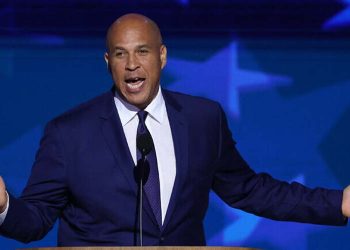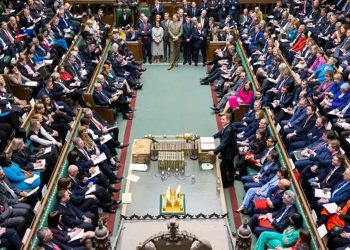PARIS: French President Emmanuel Macron defeated his far-right rival Marine Le Pen on Sunday by a comfortable margin, early projections by pollsters showed easily securing a second term.
The first projections showed Macron securing around 57-58% of the vote. Such estimates are normally accurate but may be fine-tuned as official results come in from around the country.
Victory for the centrist, pro-European Union Macron would be hailed by allies as a reprieve for mainstream politics that have been rocked in recent years by Britain’s exit from the European Union, 2016 election of Donald Trump and the rise of a new generation of nationalist leaders.
Macron will join a small club – only two French presidents before him have managed to secure a second term. His margin of victory looks to be tighter than when he first beat Le Pen in 2017, underlining how many French remain unimpressed with him and his domestic record.
That disillusion was reflected in turnout figures, with France’s main polling institutes saying the abstention rate would likely settle around 28%, the highest since 1969.
Against a backdrop of Russia’s invasion of Ukraine and the ensuing Western sanctions that have exacerbated a surge in fuel prices, Le Pen’s campaign homed in on the rising cost of living as Macron’s weak point.
She promised sharp cuts to fuel tax, zero-percent sales tax on essential items from pasta to diapers, income exemptions for young workers and a “French first” stance on jobs and welfare.
Macron pointed to her past admiration for Russia’s Vladimir Putin as showing she could not be trusted on the world stage, while insisting she still harboured plans to pull France out of the European Union.
In the latter part of the campaign as he sought the backing of left-leaning voters, Macron played down an earlier promise to make the French work longer, saying he was open to discussion on plans to raise the retirement age from 62 to 65.
In the end, Le Pen’s policies – which included a proposal to ban people from wearing Muslim headscarves in public – remained too extreme for many French.
Macron’s decision to run for the presidency in 2017 and set up his own grass roots movement up-ended old certainties about French politics.
Macron’s non-partisan centrism has sped the electoral collapse of the mainstream left and right, whose two candidates could between them only muster 6.5% of the first-round vote on April 10.





































